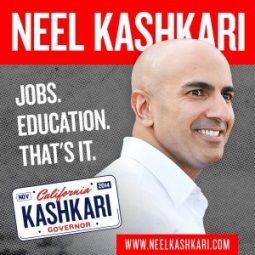Schools case fuels Kashkari campaign
by James Poulos | July 30, 2014 9:56 am
 The historic Vergara school liberty ruling has handed a campaign issue to Neel Kashkari, Republican candidate for California Governor. In the ruling, as described by[1] education reformer and former state Sen. Gloria Romero, Los Angeles Superior Court Judge Rolf M. Treu upheld nine children’s “claims of the unconstitutionality of five key education statutes that, collectively, have handcuffed schools, depriving predominantly poor and minority students of their right to a quality education.”
The historic Vergara school liberty ruling has handed a campaign issue to Neel Kashkari, Republican candidate for California Governor. In the ruling, as described by[1] education reformer and former state Sen. Gloria Romero, Los Angeles Superior Court Judge Rolf M. Treu upheld nine children’s “claims of the unconstitutionality of five key education statutes that, collectively, have handcuffed schools, depriving predominantly poor and minority students of their right to a quality education.”
Kashkari intends to make the most of it.
In a concerted effort to gain traction against Gov. Jerry Brown, who enjoys a commanding lead in the polls, Kashkari has moved quickly to capitalize on the Vergara case, which is likely to be appealed during his statewide campaign.
Gearing up
Kashkari’s approach began in an unpredictable way. Mid-month, Kashkari crashed the American Federation of Teachers convention, putting Vergara front and center in his remarks to reporters. “The Vergara case is very personal for me,” he said[2], “because I was a brown kid, a minority kid and from an immigrant family.” Likely banking on the dramatic invocation of 60th anniversary of the Brown vs. Board of Education[3] U.S. Supreme Court decision in the Vergara ruling, Kashkari said Brown’s “silence” on the matter was “offensive” and betrayed the equal opportunity legacy of Martin Luther King, Jr.
In a followup conversation with the San Francisco Chronicle, Kashkari nearly used Vergara as a context for viewing his campaign, rather than the other way around. “This is the most important civil rights case for years, and it will have national implications,” said[4] Kashkari. Brown is “not going to be able to ignore me or the kids who are affected. I’m not going to let him get away with it. That’s why I’m running for governor.”
Reached for comment by the Chronicle, a Brown spokesman observed that the Vergara ruling is “tentative” and “being reviewed.”
An unanticipated advantage
During the primary race in which his main opponent was Assemblyman Tim Donnelly, a fellow Republican, Kashkari trained his sights on Brown from the beginning. Kashkari centered his campaign around jobs, education and Brown’s prized high-speed rail project, dubbed the “crazy train” by Kashkari. To effectively challenge Brown, however, it was clear that Kashkari had to develop a broader set of campaign issues. That’s where Vergara came in.
The case’s ruling — surprisingly harsh, from the standpoint of teachers’ unions and their political allies — gave Kashkari an opportunity to play to his strengths. For conservative commentators who may be leery of Kashkari’s history as the architect of the federal TARP bailouts in 2008 under President George W. Bush, Kashkari’s greatest advantage is his distinctive background.
As a young, libertarian-leaning, pro-business Indian-American, Kashkari strikes a contrast with Brown along several fronts. In spirit and image, the Vergara ruling matches up well with Kashkari’s political brand. For the Kashkari campaign, the candidate could draw flattering associations between himself and the Vergara plaintiffs — an unexpected, ethnic-minority challenger to a Democrat-dominated status quo.
Themes
Of course, a candidate as successful and well-connected as Kashkari shouldn’t go too far in comparing himself with children among the least advantaged in California. Nevertheless, his focus on Vergara underscores the themes and attitudes that have already earned him praise among the likes of George Will.
The longtime conservative columnist recently enthused over Kashkari’s candidacy, praising him as a 21st century Barry Goldwater. The conservative Goldwater, Will wrote[5], knew he wasn’t going to be elected president, losing to President Lyndon Johnson in 1964; but he also knew he could change the GOP. In that way, Will continued, Kashkari holds “an agenda and spirit similar to Goldwater’s,” and “relishes ‘turning upside down’ the parties’ stereotypes.”
It remains to be seen whether Californians will prove as interested in a political transformation as Americans were in the years that followed Goldwater’s historic loss, as the conservative movement rose from the ashes of 1964 and elected Ronald Reagan president in 1980. For Republicans accustomed to disinterested voters, however, that uncertainty alone is welcome news.
- as described by: http://www.losangelesregister.com/articles/teachers-600918-education-california.html
- said: http://www.latimes.com/local/education/la-me-pol-brown-teachers-20140712-story.html
- Brown vs. Board of Education: http://www.uscourts.gov/educational-resources/get-involved/federal-court-activities/brown-board-education-re-enactment/history.aspx
- said: http://www.sfgate.com/politics/article/Kashkari-shows-up-at-teachers-convention-to-5616353.php
- wrote: http://www.columbian.com/news/2014/jul/27/kashkari-is-californiau2019s-goldwater-20/
Source URL: https://calwatchdog.com/2014/07/30/schools-case-fuels-kashkari-campaign/